There are some powerful odors that can pass
Out of the stoppard flagon; even glass
To them is porous. Oft when some old box
Brought from the East is opened and the locks
And hinges creak and cry; or in a press
In some deserted house, where the sharp stress
Of odors old and dusty fills the brain;
An ancient flask is brought to light again
And forth the ghosts of long-dead odors creep.
When opening a perfume bottle and receiving a jolt that lifts some recollection from the depth of memory, I often think of Charles Baudelaire’s The Flask. The word perfume derives from Latin: per means through, fumum signifies smoke. Through the smoke of incense offerings to the gods… Through the mist of time, the past comes back in veils of images long lost under the layers of information the brain processes on daily basis. Three percent of our genes are devoted to olfaction, which is an impressive number. According to my neuroscience textbook (Nicholls et al., 2001), “odors are detected in a patch of about 100,000 olfactory receptor neurons whose axons project through a thin portion of the frontal skull to the olfactory bulb.” In comparison to visual and auditory receptors (four and one, respectively), the number of olfactory receptors is much higher, about 1,000. Moreover, unlike other receptors, they are continuously replaced….
I step into the blinding June sunlight, determined to take a walk despite the heat. The scent of my sunscreen mixed with a hint of Après l’Ondée almost changes the scenery around me, taking me back to Warsaw, where I was gathering data on economic reforms in July of last year. I was interviewing various Polish politicians, and in between talking about the benefits of establishing local governments and copying endless data from the Statistical Library, I would wander around the city, exploring its parks—my favorite Park Łazienkowski overgrown with mock orange and some white shrub that smells like wet paper, outdoor café shops, and museums. After a Polish guide went on a long harangue about Russians during a visit to yet another palace, I wisely decided to hide my Russo-Ukrainian origins. I would usually say that I was Estonian, until a cab driver asked me what is “hello” in Estonian. I muttered something incomprehensible and quickly paid my fare, giving him far too large of a tip by accident.
And suddenly, I am standing in a middle of one of the oldest American cities, and the memory of Warsaw, including this incident springs to my mind as if some invisible button was pushed. The same feeling of being caught in a lie makes me blush immediately, followed by a nostalgic longing for a cup of coffee and a piece of charlotka, a Polish apple cake, at Blikle café. Someone once remarked, if only moments can be bottled. Indeed, they can.
Yet, the scent can not only conjure the past, it can shape new longings and new visions. In conclusion, I would like to quote another of Baudelaire’s poems, Exotic Perfume, which explores the images that the poet envisions after inhaling his lover’s perfume:
Islands of Lethe where exotic boughs
Bend with their burden of strange fruit bowed down,
Where men are upright, maids have never grown
Unkind, but bear a light upon their brows.
Led by that perfume to these lands of ease,
I see a port where many ships have flown
With sails outwearied of the wandering seas…
Painting: Portrait of Baudelaire by Gustave Courbet, 1848.
References: Nicholls et al, 2001; The Poems and Prose Poems of Charles Baudelaire. Ed. James Huneker.
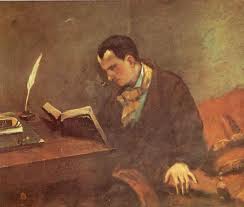
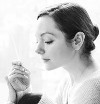


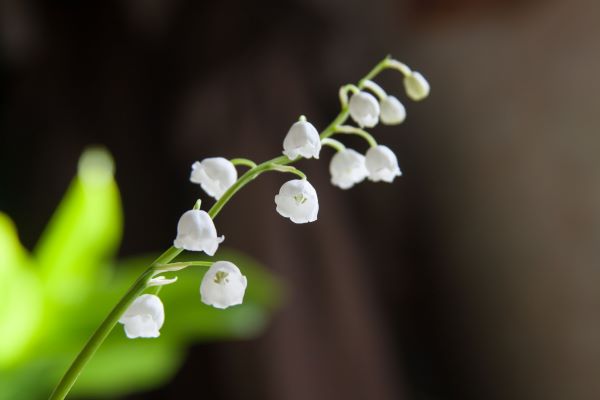
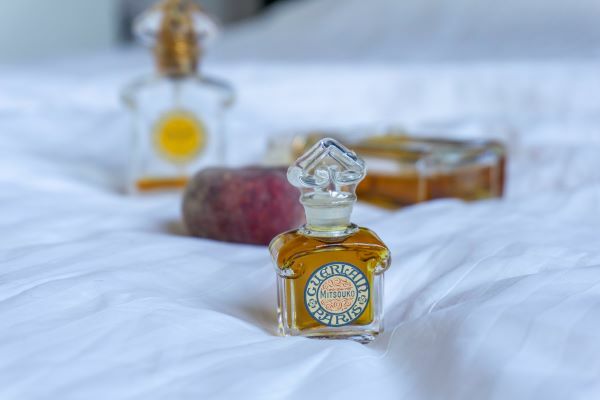








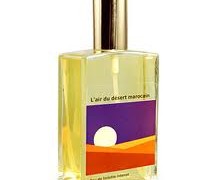
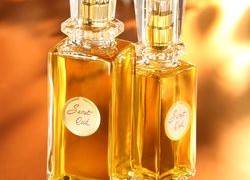
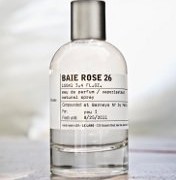
10 Comments
Diane: Aww, dear V, perhaps you’ve guessed, but I love Baudelaire, too. In fact, I was thinking of using The Flask for my entry on the very subject. As you know, I’m in absolute agreement that memories can be recorded. Perfume has proven to be highly successful at this task 🙂 June 10, 2005 at 6:07pm
Victoria: I was reading my Baudelaire’s collection, and I was struck again by the fact of memory and scent being linked as much as they are.
“And in your garments that exhale your perfume
I would bury my aching head,
And breathe, like a withered flower,
The sweet, stale reek of my love that is dead” (Lethe).
And his vision of beauty is bound strongly with the reverie and reflection. Beauty is something that have an element of oddness as well as melancholy. I love his poetry, and have placed a flower on his grave in Cimetière du Montparnasse. June 10, 2005 at 9:22pm
Diane: Yes, as reflected in his work, he ties beauty to something slightly awry, corrupt, obscene.
“Would that thy breast, where so deep thoughts arise,
Breathed forth a healthful perfume with thy sighs;
Would that thy Christian blood ran by wave by wave
In rhythmic sounds the antique numbers gave,
When Phoebus shared his alternating reign
With mighty Pan, lord of the ripening grain.” (The Sick Muse)
I didn’t get a chance to visit his grave the last time I was in Paris. Pressed for time, I left yellow roses only for Chopin that summer. June 10, 2005 at 10:10pm
Tania: Your madeleine moment reminds me of Diane Ackerman’s book, The Natural History of the Senses. The first chapter is on smell. She says we think because we smell: that the brain itself evolved out of a collection of olfactory ganglia. And perhaps that’s why smell seems to have such a direct connection to our memories, why it has such a power to evoke. Fine book, that. (Fine post, here.)
Oh, and your pretending to be Estonian cracks me up–it reminds me of when I was trying to pass for actual Filipina (not Filipina-American) in a shop in Bali, so I wouldn’t have to pay the American price. I even made my boyfriend stand outside so they couldn’t see he was white. But then I got confronted: They asked me how you say thank you in the Philippines. I froze for one second, then answered, “Salamat!” Which I vaguely think is correct, but hell, I don’t know, and I knew they didn’t know. Then they all became very cheerful, saying, Salamat! Salamat! It is like our hello! And then they looked at me and said, slyly, But you have an American husband…(pointing outside, to where Will was looking in) and I rolled my eyes and paid the American price. June 11, 2005 at 12:16am
Diane: I love her writing. I’ve only read excerpts, but her metaphors are fascinating and she writes beautifully. Have you read her latest, Tania? Umm.. something about the alchemy of the brain.
Ah, the phenomenon of pretending to be native, I can pass as a native in Japan IF I don’t talk too much. But some of them catch on right away and are too polite to comment. Oddly enough, some sales people would even give me a discount if they found out I was American. June 11, 2005 at 1:21am
Victoria: T, Ackerman’s book has been on my long to-read list, however, as you well know, graduate school leaves little time for pleasure reading. I might catch up now. I find the idea of brain evolving out of olfactory ganglia to be fascinating. Oddly enough, olfactory receptors seem to be present in the most unlikely places, like spermatosoids.
Your story made me laugh out loud. Yes, in Poland, it was better to be something other than Russian (Ukrainian is not so bad, but then again, some people are still angry about Lviv being part of Ukraine). So, I thought, Estonian might work and how frequently would you encounter any Estonian speaker? I could not pass for an American, because of my accent. A couple of times I tried and got rather suspicious stares, “but what are your true origins?” Europe is a minefield, as far as identity is concerned! June 12, 2005 at 11:19am
Victoria: D, that also made me smile! Discount for being an American? That is interesting, and not wholly unexpected. I would love to visit Japan, if only to have an incentive to brush up on my Japanese. I miss speaking it. Apparently, I have no accent when I speak Japanese, because Russian vowels tend to have same pronounciation as do Japanese. June 12, 2005 at 11:23am
LaureAnne: Victoria, what a charming post. I love this blog. June 12, 2005 at 3:49pm
Victoria: Dear L, it makes me happy knowing this! xoxo June 13, 2005 at 1:56am
Falcino: The painter’s name is Gustave Courbet, not August… April 15, 2007 at 5:54am